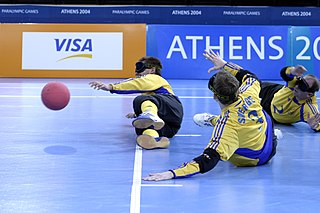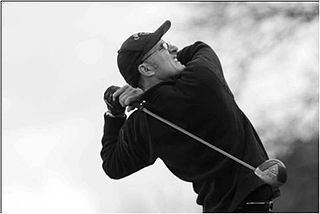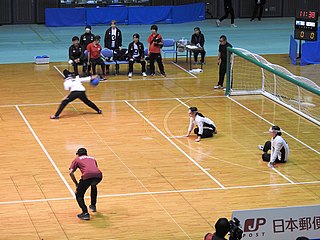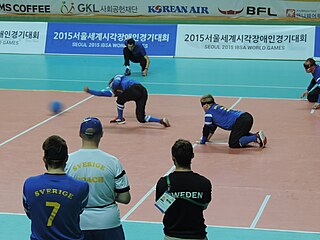Paralympic football consists of adaptations of the sport of association football for athletes with a physical disability. These sports are typically played using International Federation of Association Football (FIFA) rules, with modifications to the field of play, equipment, numbers of players, and other rules as required to make the game suitable for the athletes

Goalball is a team sport designed specifically for athletes with a vision impairment. Participants compete in teams of three, and try to throw a ball that has bells embedded inside of it into the opponents' goal. The ball is thrown by hand and never kicked. Using ear-hand coordination, originating as a rehabilitation exercise, the sport has no able-bodied equivalent. Able-bodied athletes are also blindfolded when playing this sport.
Paralympic Nordic skiing is a Winter Paralympics sport consisting of biathlon and cross-country skiing. The sport is governed by the International Paralympic Committee, with its subcommittee for Nordic skiing known as World Para Nordic Skiing.

The Paralympic sports comprise all the sports contested in the Summer and Winter Paralympic Games. As of 2020, the Summer Paralympics included 22 sports and 539 medal events, and the Winter Paralympics include 5 sports and disciplines and about 80 events. The number and kinds of events may change from one Paralympic Games to another.
A sighted guide is a person who guides a person with blindness or vision impairment.

B1 is a medical-based Paralympic classification for blind sport. Athletes in this classification are totally or almost totally blind. It is used by a number of blind sports including blind tennis, para-alpine skiing, para-Nordic skiing, blind cricket, blind golf, five-a-side football, goalball and judo. Some other sports, including adaptive rowing, athletics and swimming, have equivalents to this class.

B2 is a medical based Paralympic classification for blind sport. Competitors in this classification have vision that falls between the B1 and B3 classes. The International Blind Sports Federation (IBSA) defines this classification as "visual acuity ranging from LogMAR 1.50 to 2.60 (inclusive) and/or visual field constricted to a diameter of less than 10 degrees." It is used by a number of blind sports including para-alpine skiing, para-Nordic skiing, blind cricket, blind golf, five-a-side football, goalball and judo. Some sports, including adaptive rowing, athletics and swimming, have equivalents to this class.

B3 is a medical based Paralympic classification for blind sport. Competitors in this classification have partial sight, with visual acuity from 2/60 to 6/60. It is used by a number of blind sports including para-alpine skiing, para-Nordic skiing, blind cricket, blind golf, five-a-side football, goalball and judo. Some other sports, including adaptive rowing, athletics and swimming, have equivalents to this class.
Para-alpine skiing classification is the classification system for para-alpine skiing designed to ensure fair competition between alpine skiers with different types of disabilities. The classifications are grouped into three general disability types: standing, blind and sitting. Classification governance is handled by International Paralympic Committee Alpine Skiing. Prior to that, several sport governing bodies dealt with classification including the International Sports Organization for the Disabled (ISOD), International Stoke Mandeville Games Federation (ISMWSF), International Blind Sports Federation (IBSA) and Cerebral Palsy International Sports and Recreation Association (CP-ISRA). Some classification systems are governed by bodies other than International Paralympic Committee Alpine Skiing, such as the Special Olympics. The sport is open to all competitors with a visual or physical disability. It is not open to people with intellectual disabilities.
Goalball classification is the classification system for goalball. Goalball players with a disability are classified into different categories based on their vision based disability type. The classification is handled by the International Blind Sports Association.
Disability judo classification is the medical classification system for disability judo. Judokas with a disability are classified into different categories based on their disability type. The classification is handled by the Blind Sports Association.

The Turkish Blind Sports Federation is the governing body to encourage and develop the sport for the blind and vision-impaired in Turkey. It is a member of the International Blind Sports Association (IBSA) and the International Paralympic Committee (IPC).

Disability golf classification is used for deaf golf, blind golf, amputee golf, golf for mentally disabled people, paraplegic golf and other forms of golf involving people with disabilities.
B4 is a blind sport classification used in a variety of sports including sailing, bowls, swimming, and cycling. Unlike other blind sport classes, it only uses visual acuity for the purpose of being classed into it.

Japan women's national goalball team is the women's national team of Japan. Goalball is a team sport designed specifically for athletes with a vision impairment. Its women's team has internationally completed including at the IBSA World Goalball Championships and the Paralympic Games.
The IBSA World Games or World Blind Games are an international multi-sport event, occurring every four years, organized by the International Blind Sports Federation (IBSA). The events enable blind and partially sighted athletes to compete in a number of sports. The first event took place at Madrid, Spain in 1998.
The World Blind Football Championships, formerly the Football-5-a-Side World Championships, were played for the first time in 1998.
Blind football is played in Australia. The sport was introduced in the country in Victoria in 2014 as a result of Blind Sports Victoria creating a blind football development program. A regional blind football league was created in Victoria in 2015. The following year, the International Blind Sports Federation (IBSA) held a workshop in Melbourne, which was attended by representatives from blind sport organizations in New South Wales. Blind football continued to develop in 2017, governance of the sport was transferred to Blind Sports Australia who wanted to create a national team and develop the sport outside Victoria. That year also saw Australia get is first IBSA recognized blind football referees. In 2018, a talent development search took place in Sydney.

The 2015 IBSA World Games was held from 8 to 18 June 2015, in Seoul, South Korea.
The blind football at the IBSA World Games is an event of blind football at the IBSA World Games.









